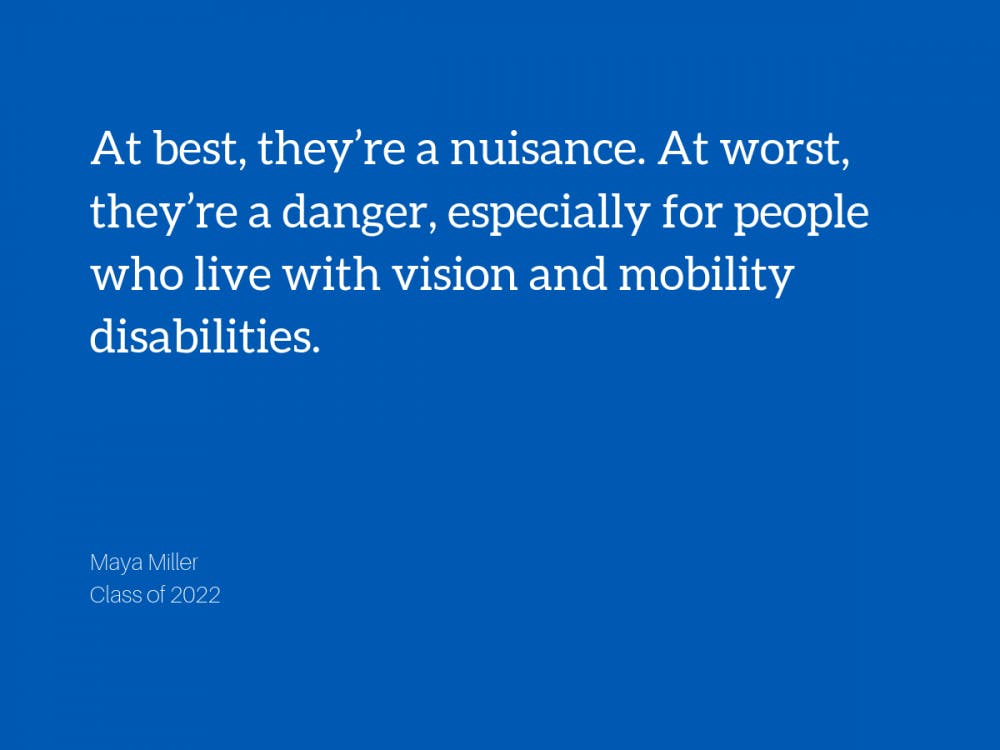“One. Two. Three. Four. Five.” On a Friday drive from East to West Campus, I tracked how many e-scooters I saw abandoned in the middle of sidewalks and on street corners. Since the semester began, I’ve lost count of how many parking offenses I’ve seen, but five illegally parked in a single cross-campus trip? Aren’t Duke students better than this?
Ever since the e-scooters invaded Durham streets (and sidewalks) back in June, students have jumped all over this convenient and cheap transportation. An e-scooter can turn the trek from Gross Hall to Biddle into a 12-minute trip, instead of a race to the bus stop only to find the C1 pulling away. And the ride costs less than $3.00! A win-win for riders and vendors, right?
Think again. I see the world through a different lens—though not by choice. My late father relied on mobility devices during his long battle against a rare neurological disease. So instead of viewing the new e-scooters as empowering and eco-friendly alternatives, my first thought was, “Wow, this is an ADA nightmare.” E-scooters parked in the middle of sidewalks and curb cuts violate the Americans with Disabilities Act (ADA). At best, they’re a nuisance. At worst, they’re a danger, especially for people who live with vision and mobility disabilities. Even for people like me who aren’t differently abled, carelessly parked e-scooters are annoying and hazardous.
The root problems are student ignorance, apathy and lack of accountability. Duke’s Scooter Operations and Parking Guidelines explicitly say, “Scooters must be parked upright adjacent to a bicycle rack and not impede pedestrians,” and then decree that parked e-scooters shouldn’t block pedestrian pathways, doors or access ramps, and fire hydrants. But, as students have already demonstrated, it’s pretty easy to not give a damn.
There’s no convenient way in real time to track down an illegally parked e-scooter’s last user and hold them accountable, which means there’s no incentive to park responsibly. Laziness and convenience win the day and e-scooters get left everywhere. Without an enforcement mechanism that holds users themselves accountable for their careless parking, things won’t get any better.
Students might frown at an e-scooter left in the middle of the sidewalk, and then just walk around, figuring it’s someone else’s responsibility. But when Duke senior Bryan Rusch, who uses a wheelchair, found a diagonally parked e-scooter blocking the sidewalk one day, he didn’t have time to wait for PTS to impound it. “I was just like, ‘I can’t do anything!’ Thank goodness I’m slightly able-bodied, [because] I had to get down and grab it at its base and swing it, then move myself and grab it and swing it again.” It took five minutes to move it. “There have been all sorts of small instances like that. It’s been a pain.”
In fact, even members of the Duke Disability Alliance (DDA) have been slow to grasp the scale of the issue. No one had raised it yet. “Oh, dang, I didn’t realize how true this is!” DDA’s treasurer, senior Trent Lau, told me after I asked the group to weigh in. It’s a hassle even for people who don’t live with a disability, for whom an e-scooter parked in the middle of the sidewalk still presents a safety hazard. “Last night I was running, it was dark, and I turned the corner and had to jump out of the way because there was a scooter right in the middle of the sidewalk,” said Kevin Solomon, a Duke senior and a member of DDA. “It affects everyone.”
So, how should we fix it? Dr. Marion Quirici, DDA’s faculty advisor, suggested a public shaming campaign, a strategy that president Symon Ma, a junior, agreed could work. “I think advocacy always starts with awareness, or like, you know, publicity,” Ma said.
Most Duke students aren’t heartless. In fact, they probably think they’re doing the right thing by using an “eco-friendlier” mode of transportation. “Some people really just don’t care.” says Duke’s ADA Facilities Program Director Tony Galiani. “But they [also] might not even realize what they’re doing.” Most people don’t view life through “disability goggles.” Rusch believes people need to open their eyes to how people with disabilities need to use space differently. “You could walk on the grass, I can’t. You can do this, I can’t. You could move that scooter two steps over and help me save five minutes of my day. It only takes two seconds of yours.” He said he’s even had to compete with e-scooter users for space on ADA-mandated ramps. Everyone—Duke, student activists, the e-scooter companies—has a responsibility to raise awareness around disability.
Increased awareness needs to be the first step of a larger action plan. Durham could follow Raleigh’s lead, where city officials ran Bird, Spin, and Lime out of town in favor of Gotcha, whose business model enforces greater accountability. In contrast to the others, Gotcha’s e-scooter wranglers are trained employees instead of part-time contractors. If you don’t park your e-scooter in one of their designated parking zones, expect a fine to be charged right to your phone. By switching exclusively to Gotcha, and ending business with other companies, Duke and Durham could declare a commitment to responsibility over convenience.
Change could start right now. But if students can’t be held accountable for careless e-scooter parking, Duke should simply take away the privilege of having them on campus. So, students: step it up, give a damn, or one day soon, you might wake to find your precious e-scooters gone.
Maya Miller is a Trinity sophomore.
Get The Chronicle straight to your inbox
Sign up for our weekly newsletter. Cancel at any time.

